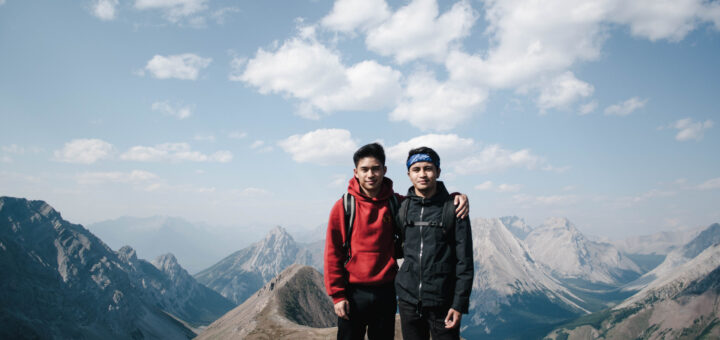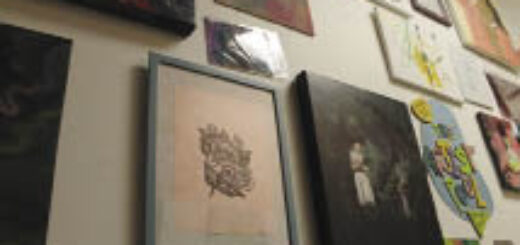Being queer and Filipino in Calgary: Battling Filipino Derogatory Words

Bakla is a Tagalog word commonly used to describe a person assigned male at birth presenting feminine traits and a feminine gender expression. It’s usually considered a third gender. People who are bakla are seen a lot in the Philippine media as a performative identity than an actual lived experiential identity. But even so, a lot of queer Filipino people spanning among gay men, transwomen and other gender identities identify as bakla. Referring to it as only gay does not do it justice because of the nature of the word.
Seb, a 26-year-old gay Filipino graphic designer from Calgary was called bakla several times when he was younger.
But this only happened when he already moved to Canada. When he was still living in the Philippines, he never had to worry about his gender identity and how people perceived that.
As an honour student who was always celebrated when he was still in the Philippines, how he presents himself is the last thing people would think of when meeting him. So even if he acts femininely, no one really batted an eye.
So when Seb was called bakla by another Filipino friend, he immediately acted defensive and denied it.
“I feel like the word bakla just already has so many harmful stereotypes that got built on it over the years that when somebody calls you that, they mean it in a rude way,” Valerio said.
The gravity of words
When Valerio learned of the social norms around masculinity and the repercussions of being gay even in a western country like Canada, Seb realized he had to be more conscious of his self-expression.
“When I started learning more of the gravity of the word “gay”, like how people like that will go to hell and those kinds of things, I really tried to mask it [being gay],” Seb added.
Seb explained that he became hyper-aware of how he moved, how he talked and how he dressed in public. Part of that also included hiding his interests in conventionally feminine pursuits such as being a fan of pop stars like Hannah Montana.
“If someone tells me that I have a little kembot when I walk, I was scared that everyone would know,” Seb adds. Kembot is a tagalog word that refers to a shaking of the hip when walking or dancing, usually seen as a feminine movement in the Philippines.
Seb remembered guys in his class making fun of him. It was about the school dance. He was ridiculed in front of everyone for being accused of wanting to take a guy to the dance. People taunted him with suggestive questions of how he’s attracted to all the boys in their class.
“I didn’t think that there was anything wrong with being gay up until those little moments where people purposely say things to get a laugh…to make people feel it’s not okay to be a certain way,”
Between privilege and discrimination
Keith, a 25-year-old nurse from Calgary, an alumnus of Mount Royal University and the current significant other of Seb, was also called bakla when he was younger.
Keith was also called bakla when he was younger.
“They twisted the word into something malicious,” Keith said, referring to how the word bakla is the only word that should be used as something that a person identifies with, but it has since evolved into a derogatory term.
Growing up in the small town of Luna, Apayao in the Philippines, Keith would hear this word and other slurs through several years of homophobic bullying when he was in grade school.
“The negative feelings towards my trauma of being picked on by bullies perpetuated my whole life,” Keith said.
Bullying deeply affected Keith’s psyche so much that even as he continued his adult life in Canada, he’s still uncomfortable around men. Until now, he only has two close male friends.
“I was always afraid that guys would judge me,” Keith added.
Keith even recalls wanting to make friends with an outspoken gay kid but retreating to his hidden self for the fear of being associated with him and further being associated with being gay.
“It’s that battle and pressure of whether I should speak freely and be myself freely or not.”
But with Keith’s mom being half-Chinese and him inheriting her fair skin complexion, Keith also experienced the privilege of being favoured due to the colour of his skin.
According to him, the town of Luna mostly has people with darker skin tones, so he naturally stood out.
“People would be nice to me because of the colour of my skin, but there are also parts of me: being feminine, being flamboyant, that they pick on.”
A CBC article from a Filipino writer in Calgary explored this fondness of the Filipino people, whether in Calgary or in the Philippines, for fair skin. According to the majority of the people Karina Zapata interviewed, it’s a prevalent belief in the Filipino culture that having fair skin is an absolute part of being beautiful.
But some Filipinos are starting to fight these cultural norms by advocating that having darker skin tones can also be seen as beautiful.
A pivotal moment
When Keith came out to his family, he was welcomed with open arms. This was obvious when his mom noticed that he was crying about something, she immediately assumed it was about his gender identity. “It’s okay, you can come out,” she immediately said, even when Keith was crying about something else instead. He took the chance and used the moment to come out.
But when it comes to his dad, it’s a different story. His dad just ignored the information. He didn’t talk to Keith about it nor did he show any sign of his feelings toward it. As many Filipino parents do when it’s time to confront a subject that can be emotional.
“He just swept it under the rug,” Keith said.
But a pivotal moment for Keith and his relationship with his Dad happened during a drive they had together. While in the car, Keith was talking to Seb and his dad heard Seb saying “I love you” to hang up the phone. To this, Edrozo’s dad jokingly butted in and said “I love you too”, and they both laughed it out. Through that one joke, Edrozo felt that his dad finally sees his gender identity and he feels fully accepted and loved by his family.
A gradual acceptance
As they’re approaching the fifth year of their relationship, Keith and Seb have gone through many memorable moments together. From exploring the sights of Alberta through their photography business to enjoying each other’s company while camping in the mountains, their relationship only flourished through the years.
But similar to a lot of Filipino gay relationships, their families needed some time to adjust to fully accept their commitment towards each other.
During the earlier stages of their relationship, Keith’s mom didn’t want to meet Seb at first. Keith says that his mom didn’t want to be a witness to this part of his life. Keith told her that this might be something that she will regret in the long term but if she’s willing to risk that, he respects her decision.
But something changed his mom’s mind during his birthday when she told Keith to invite Seb to their home. Keith thinks that she saw how healthy and joyful their relationship was that she decided that it’s time.
“And now they’re like best friends,” Keith added, referring to how his mom and Seb became closer to each other through the years.
Being Filipinos, Seb’s mom and dad were not familiar with gay relationships being part of their family. So naturally, there was some learning to do. Seb attributes his persistence in letting them meet Edrozo and getting to know his cheerful nature as to what made his family more accepting.
“Once they started seeing that our relationship isn’t that different from any normal relationship, they started being okay with it,” Seb added.
Being gay and Filipino
Keith hopes that as he progresses in life, he can show people that there isn’t only one version of being gay, of being Filipino and especially being both.
“I hope that I can open conversations about how there is something more than the stereotype of being flamboyant, and being the comedic character when you’re gay… I want to challenge that a little bit.”
He notes that there isn’t anything wrong with that stereotype at all, but it becomes dangerous when that is the only expectation that people will have for gay Filipinos.
“I’m in this community that is so much more than just one category people put us in,” Keith said.
Even with the societal risks of being both gay and Filipino, Keith sees this as a unique position. According to him, his intersectional experiences just bring him such an appreciation for the little important moments of life, and a wider perspective of what people go through.
Seb sees the privileged of living in Canada as both gay and Filipino as a tool to educate what people like him go through and how it has affected his life. It propels him to live his life with the assurance that no matter who he meets, he will have the compassion to understand them.
“Being both Filipino and gay is empowering,” Seb said.
This article is one of four stories included in the series “Being gay and Filipino in Calgary”. To access more of these stories, click here.





